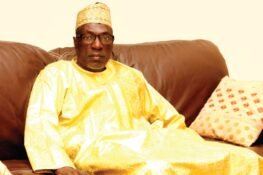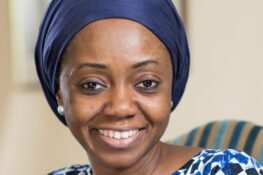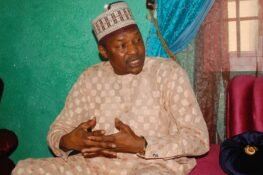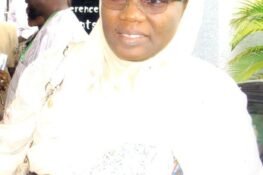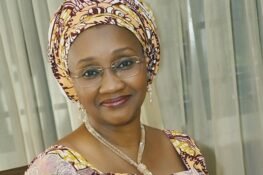Vera Nwanze, a fellow of the Pharmaceutical Society of Nigeria has enjoyed a varied career that has seen her receive numerous awards for excellence over the years. Having paid her dues in the pharmaceutical industry, she is now the General Manager, West Africa for Azuri Technologies, a provider of solar home systems to the underserved rural communities living in off-grid areas. Here, she shares her journey and life lessons as she moved up the career ladder with The Interview…
Who is Vera Nwanze in her words?
I was born Vera Nwanne Adigwe to late Mr. Frederick Obi Adigwe and Mrs Alice Adigwe (of blessed memory) both from Ibusa in Delta state, Nigeria.
A Class of May 1990 Pharmacy graduate of the University of Jos and with an MBA from Ambrose Alli University (year 2000), CEP-21 Class of the Prestigious PAN Atlantic University ( Lagos Business school, LBS), and the IESE business school, Barcelona, Spain. A Massachusetts Institute of Technology (MIT) Boston, USA certified in Enterprise Transformation, Leadership training in Stellenbosch University, South Africa. I am also a USA certified Pharmacist.
I started my career as a young Intern Pharmacist at the University of Maiduguri Teaching Hospital June, 1990 and thereafter proceeded for my NYSC at the General hospital, Makurdi, Benue State. Just immediately after my NYSC, I got my first full time job as a medical representative with Glaxo Nigeria Ltd in February, 1992 and witnessed the various mergers that eventually got Glaxo, Glaxo-Wellcome to its final merger to become GSK.
In GSK, I rose through the ranks, holding various cross-functional responsibilities, starting as medical representative( 1992 -1996), Clinical Research Manager( 1996-1997) and Regulatory Affairs manager/ Quality Assurance Manager( 1997-2002).
On the quest for greener pasture and to broaden my scope of practice, I took a sabbatical to the USA in 2002 where I got my certification of the Foreign Pharmacist Graduate Examination Board (FPGEE). I returned to Nigeria after a few years for family reasons and joined Evans Medical Plc. until 2005 when I was headhunted by Novartis Pharma as Head, Regulatory Affairs for English West Africa in 2008. The responsibility was expanded into Sub-Saharan Africa in 2008 and by 2009 GSK invited me back as Director, Regulatory Affairs for Anglophone West Africa. Within six months of getting back to GSK, Novartis called me back to take over the general manager position for English West Africa. It was as if I was the toast of the Pharmaceutical industry. Though it all made me ambitious, I was more humble and focused.
To ensure a smooth transition, I gave some time before the move and returned to Novartis in November 2010 and held the general manager position, titled, Country Group Head for West Africa. I held the position for four years where I had to rebuild the organisation, attracting and developing talents, grew the business and built relationships with key stakeholders.
This could be seen as the peak of my career but I remained humbled and focused.
There you were in the pharmaceutical industry and at the top echelons of the profession but you chose a very unusual change, a move to the tobacco industry. What made you decide to go for the move?
Having spent over 25 years in the Pharmaceutical industry with cross-functional experience and exposure and attaining the peak of my Pharmaceutical career available within the region, (although, as you can see, I did not have an elevator ride in my career) and next position or step up the ladder would necessitate a move out of the country and I was not open to that for family reasons. So it was a time to decide, what else, what next? What can challenge me? I decided to have a different experience and Philip Morris International gave me that opportunity.
Quite a big leap from the pharmaceutical industry to tobacco! Given that pharmacy is all about healthcare, did you not feel any conflict with your move?
One of my objectives was to be a success in the pharmaceutical industry and other industries. One of my mentors is Prince Julius Adelusi Adeluyi. I went to him to discuss my conflict about going into the tobacco industry. He advised that there was nothing wrong. He gave me a push and my husband also encouraged me. I became general manager for Phillip Morris International, building the business from the scratch, developing people and product. Together with a lean team at first, I was able to register and successfully launched five key products in the country while growing the business further.
The Pharmaceutical industry In recognition of my contributions to the industry in people and business development, in February 2016, awarded me a Fellow of the Pharmaceutical Society of Nigeria (the highest recognition in the industry.)
From one major industry change to another – You then moved from the tobacco industry into the solar energy world. How did that come about?
Now, as a fellow of the Pharmaceutical Society of Nigeria, there are some expectations, and the quest for further diverse experience and to further test my proficiency ( as my mentor would always say, ‘ DO NOT LIMIT YOURSELF’ I accepted to serve in electrifying over 16 million Nigerian households of low-income cadre, living in the rural off-grid communities, by offering them renewable energy services on a PAYGO model which means they have access to energy at a convenient affordable payment pattern until that time they can own the system completely. This for me is appealing and satisfying as they are now connected to the rest of the world, with financial inclusion. For the government, it is beyond just data collation but providing distributed economy which means, job opportunities to locals with bottom-up economy and decongesting the urban surge while improving the lives of the people, lighting up their evenings, children can study more and do better in school, and the people, becoming more productive. It is a combination of corporate social responsibility and enterprise.
Is Azuri also a Not-for-profit organisation?
No, we are not. By social responsibility, I mean that we impact lives even while being commercially focused. It isn’t only about the returns, it is also about transforming lives and that is at the core of our business. Azuri is making a difference by creating employment and opportunities for those who need it the most.
Being in partnership with government, as we know many projects have become dead in the water or fail to deliver on the promise. What makes this solar initiative different?
Part of what I believe we can achieve is to change the idea that government projects are doomed to fail. I am not a government spokesperson but I can say that we are committed to excellent delivery and would only go into a partnership if we believe that the outcomes will be positive. We will do our part to gain and keep the trust of Nigerians; we are working with local partners to achieve the best outcome. Already, the enthusiasm for our product is second to none. We are already in 12 African countries and plan to build on this. The proof of the pudding is in the eating. Our products are of high quality and we have been delivering this in other parts of Africa since 2011.
And you see, we can appreciate that government alone cannot solve all of Nigeria’s problems. We are now at a stage in the country that public-private partnerships are key and we can begin to build infrastructure and attain the heights that a nation such as ours deserves.
Government will do their part to ensure that regulation and policy allows for businesses to flourish and to encourage both foreign and local investors into the country.
You have mentioned that your company is creating employment and that’s a positive thing but surely another way of assisting the Nigerian economy out of recession would be to manufacture locally but you are not yet doing that. Why is this so?
Ideally, the whole product flow should be local. It is certainly something that we are looking at and it also rests on the scale of the business. Stakeholders in the industry have been engaging with government and the power sub sector on how we can all work together to foster an environment where local manufacturing will play a greater part than importation. Steps are being put in place towards this goal and there are many factors that will make it a success. Nigeria is getting there but there’s quite a way to go yet.
Epileptic power supply has become the norm for most Nigerians, why is your concentration on rural areas and not urban centres, given that many in the cities are suffering the same lack of electricity and would be grateful to have an alternative source of power?
As I reiterated earlier, on social responsibility, we have a specific focus. We want to reach the underserved. This means those that are totally off the national grid and have not even seen anything remotely close to electricity in their communities. You would be surprised at how many Nigerians are in this category. Do you know that over 55 per cent of Nigerians lack access to electricity, In a country of 180 million people, that means about 90million people still have to rely on kerosene for their daily energy needs and in the best, diesel or ‘I beta pass my neighbour diesel generator ‘ with the attendant health issues?
Think about the health risks associated with this and how many accidents we hear about and the thousands that we do not even get to hear of except that some forces have taken their lives!!!! That is why there must also be a solution for those who do not have any other option. They must also be allowed to enjoy clean, affordable and renewable energy. A lady recently shared her story with us about how her mother used to dip some fabric cut from her wrapper into some fuel to light it for her to study at night. She didn’t see electricity until she turned 15! That lady has completed her education now and has an excellent job. We don’t want others to have to wait until they are 15 to enjoy what a lot of us take for granted. We want them to have that opportunity now. Lack of access to electricity has had an adverse effect on Nigeria’s socio-economic environment.
And it goes beyond electricity – payments are made using mobile money and that encourages financial inclusion. These communities are oftentimes kilometres away from the nearest bank and in any case, are unused to dealing with financial institutions so would not want to venture near one. With mobile money, they can at least be served and to begin to reorient themselves on financial issues.
Would you say solar is the way to go?
Absolutely, a YES! Especially in Nigeria where we should be asking ourselves why it’s taken so long to really look at it as a viable option to other sources of electricity. Of course, initially it was expensive but I think there was much less focus on how successful it can be. It’s cheaper in the long run and of course much cleaner. Solar radiation in Nigeria is in abundance. It’s God’s natural gift to us, so let’s use it well. Technology has moved in leaps and bounds to harness this and be able to generate electricity from the sun. Government has put in place a renewable energy policy to encourage the sector so definitely, we are seeing only the beginning of what is potentially a revolution. Definitely we can say that renewable, affordable and clean energy is the way to go.
Do you have what we could call a typical day?
My typical day starts with early morning telephone conference call (as I work with colleagues living in diverse countries across the world,) putting up slides for one presentation or the other and getting ready for conferences, when I am not travelling. Asking what food my husband would like to take to work to enjoy with his colleagues and cracking my head on placing calls across to my children to know how they are coping with their lives and studies, and remember to return missed calls and ask of the well-being of relatives and friends, and it goes on…..
What drives you?
I believe in integrity, transparency, equity, fairness and accountability with of course, love. I believe in showing affection to all especially the down trodden and also making a difference, no matter how little. These re-energise and motivate me. I like mentoring, Coaching and talent development, especially, the young ones.
Indra Nooyi, the CEO of Pepsico and 14th on Forbes’ list of most powerful women in the world, is quoted as saying that she concluded that “women can’t have it all” in relation to trying to manage a career and family life. From your personal experience would you say that her statement speaks to all women in the workplace?
Yes, it does, especially in our society where a woman is seen as second class. It hurts especially as the criticisms come even from co-women, who perhaps due to inability to work as hard as you do, turn to criticise you and several kinds of stereotypes formed. Some assume you cannot be married and keep your career, some assume you must be sleeping with one boss to rise to where you are. To some, your husband must be a ’mumu’ since you are calling the shorts and so all kinds of bad blood begin to breed, but with focus and looking unto God, His grace is sufficient for me.
Would you say that it is difficult as a Nigerian woman to progress in the workplace or even to get to the top of her field?
Yes, more in the past but changing these days. Personally I would say it is not difficult once you know the antidote, ‘do not listen to what people say’. Be focused and diligent. Be YOU!!
There are still more men in the C-suite than women, would you say you have missed any opportunities because of your gender?
Categorically, yes. I remember vividly some of my male managers in the past, when opportunities for promotion arise in the work place, they offer it to the male colleagues and they seem to be justifying it by making comments such as, ‘you(the female), ‘you don’t need it because your husband is there’ , ‘I don’t want your husband to hate me because I promoted you to earning salary more than him’ ‘you are a woman, so just stay on that level, what do you need the money for? This is so painful especially when it is glaring that the male colleagues who were promoted or offered the salary raise do not deserve it over you. But that is the experience. Now it is changing more and more.
The 30 per cent club and 30 per cent by 2030 are just two of the targets set to raise the percentage of women on corporate boards, do you think these will be effective and are they are step in the right direction?
They are steps in the right direction, but a lot of sensitisation is still needed in Nigeria to ensure gender equality so that women get their right positions and are also respected.
What were the challenges that you faced on the journey?
Castigation, hate speeches, stereotypes, some refer to you as ‘Man’, that you are too aggressive; you are struggling with the men instead of being at the back stage. At the back of their minds, they just hate your guts. For most, for example, as our, baba-in-chief pronounced in the international arena, ‘the place of the woman, is in ‘the other room’ but we women say NO to that Castigation and we keep moving!
What formed your support system during your career?
First of all is God Almighty, my maker. I always pray. Then, commitment, focus and self-determination.
With the benefit of hindsight, what nuggets of advice would you give to the young Vera? What are those things you wish you had known earlier in your career?
Simple, Be You, Nothing is difficult to achieve, once you set your mind and eyes on it. ‘GO FOR IT’
Knowing that, you can’t win all. Some people will hate you just for no reason.
Nothing comes on a platter of gold. You have to pay the price.
What are your medium and long-term goals?
I can say I have achieved my medium goals. Having led various multinational businesses at country and even regional levels, Novartis, Philip Morris and now Azuri Technologies, seeing talents developed, rise in their career at tops, in various sector. I aspire to leave a legacy of hard work, perseverance and humility with great exemplary achievements.
What story of your life would you like to share?
The story is titled, ‘The game changer in my life /career.” The date was January 4, 1992 . I had the opportunity to have my first job interview. This was as I was about rounding up my NYSC, I applied for medical representative role in Glaxo. I already identified that I didn’t want to work with government, I wanted a multinational so Glaxo, Roche, SmithKline-Beecham and others were on my shortlist. On getting to Glaxo in Agbara on January 3, 1992, I found out that the test for the new medical representatives was to hold the next day and I asked the HR if I could join. I was very scared as I saw many people studying a lot of paperwork in the morning when I arrived the venue.
I asked one person, a male what they were studying and he just waved me off as if I was disturbing him. I went to another person to try to prepare but he told me that based on his inside information, I should not waste my time to take the test and when I asked why he said that they wouldn’t take a woman because of the belief that they take too much time off work and that my alma mater, University of Jos, was not known for strong pharmacy graduates yet and above all they needed people with little experience but I was just a ‘Corper’… This judgement of his struck me as very discriminatory and I deep dived to get the details and he said ladies were going to certain locations/territories and having babies, making excuses etc. I said to myself that I’m going to change this dynamic. ……the rest is now HISTORY.
On a lighter note, which personality would you most like to invite to dinner tonight and why?
The down-trodden, to give them a life time opportunity. Make a change in their life.
Away from work, what do you do to relax?
(Laughs) I hardly do. Over the years, I have gotten myself to work and work. As one of my Pharmacy school mates was teasing me some days ago on telephone, ‘you are ever busy, even when there is nothing to do, you must find something to do. You will pick up the broom or start washing plates that people have already washed because you feel it is not clean enough’. I strive for perfection. However, when I have the time, I love to swim, and I play Golf.


